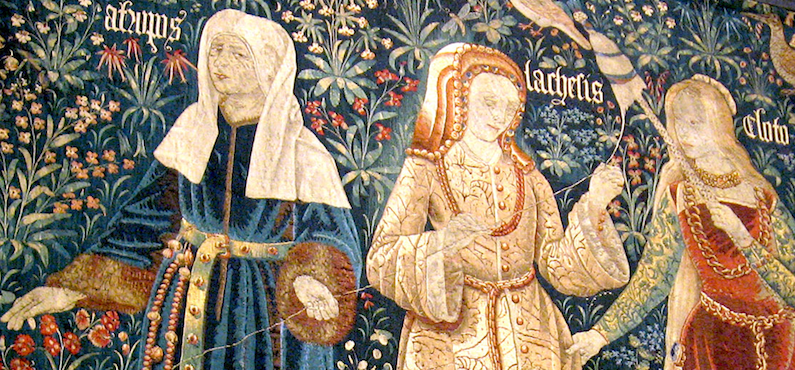According to Greek mythology the fate of each and every individual is determined by the cool and steady hand of three sisters, collectively known as the Μοῖραι (moirai). Their name is derived from the verb μείρομαι (mēromai), to receive as one’s lot. Each on her own is known by the corresponding singular μοῖρα (moira), which word can also, when not personified, mean part or measure, and therefore that which has been measured out for oneself by the three sisters, i.e. fate. The idea of fate as a measure imposed on human existence comes from the concept of these three sisters weaving the thread of each and every human life – some of them strong but short, others long but slight. The first sister spins the fibres of consciousness into a unique thread of being, therefore she is called κλώθω (klōthō), which, as a verb, means to twist, spin. The middle sister measures the thread so spun, which earned her the name Λάχεσις (Lakhesis), derived from the verb λαγχάνω, meaning to allot. Ἄτροπος, the one who cannot be turned away – from the verb τρέπω, to turn – finally severs the thread with her icy grip.
A very similar concept of fate can be found in Old Norse mythology, where the three Norns, called Urðr (fate), Verðandi (becoming) and Skuld (tax, payment) rule over the lottery of fate.
In Old English the concept of the fatal trio of siblings is absent. Fate is called wyrd, lit. that which becomes or takes place, a word derived from the verb weorðan, to become (c.f. German werden). Slowly the original and very specific meaning of the word faded away and was replaced by a vague notion of various degrees of uncanniness and strangeness and thus became the modern English word weird. Originally, as an allusion to the Greek concept of fate, the word only featured in the phrase the Weird Sisters – and it is there that we still find it in Shakespeare’s Macbeth.
To you they have showed some truth.

